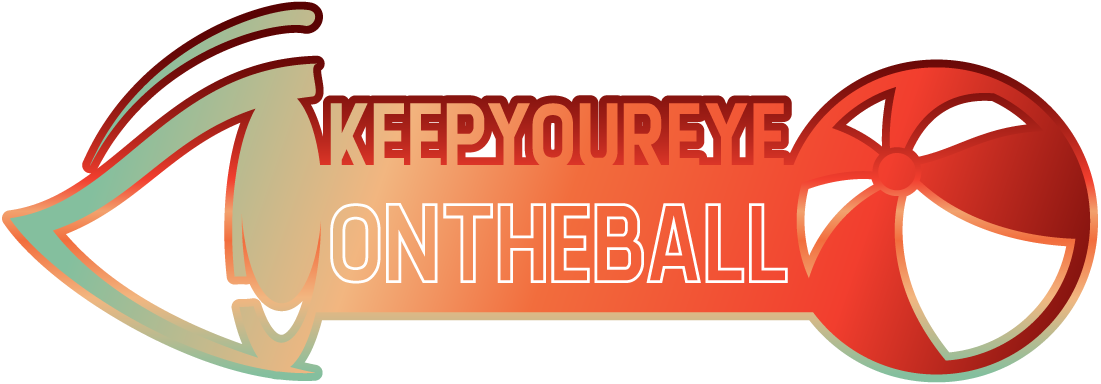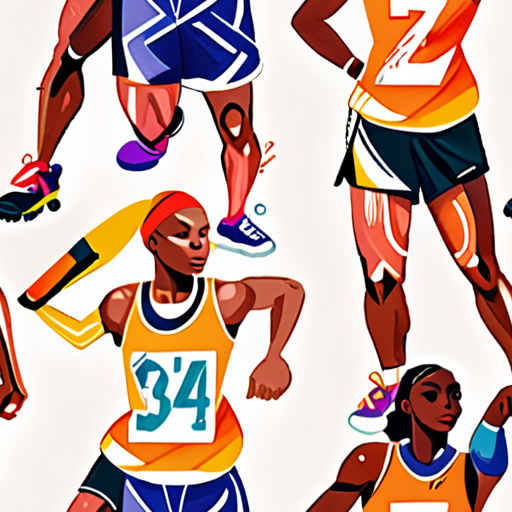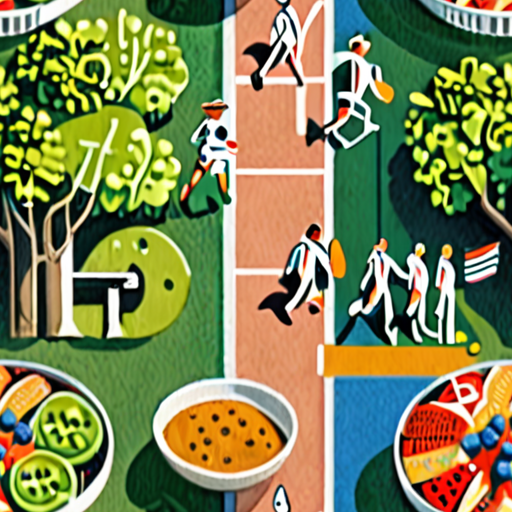As athletes strive to optimize their performance and achieve peak physical condition, a well-planned healthy eating strategy plays a crucial role in fueling their bodies for success. With numerous diets and nutrition plans available, determining the most effective approach can be overwhelming. In reality, there is no one-size-fits-all solution, but rather a personalized approach that takes into account individual needs, goals, and preferences. By understanding the importance of nutrition in sports, athletes can develop a comprehensive plan that addresses their unique requirements, leading to improved performance, enhanced recovery, and overall well-being.
What is the Healthiest Diet for Athletes?
A well-planned diet plays a crucial role in supporting athletic performance and overall health.
- Eat a balanced mix of protein-rich foods, complex carbohydrates, and healthy fats to fuel your body for optimal performance.
- Incorporate a variety of whole grains, fruits, and vegetables into your diet to provide essential vitamins, minerals, and antioxidants.
- Choose lean protein sources such as poultry, fish, beans, and lentils to support muscle growth and repair.
- Include healthy fats like nuts, seeds, avocados, and olive oil in your diet to support energy production and overall health.
Nutrient-Dense Foods for Athletes
The following foods are rich in nutrients and can help support athletic performance:
- Fatty Fish: Fatty fish like salmon, tuna, and mackerel are high in omega-3 fatty acids, which reduce inflammation and promote recovery.
- Berries: Berries like blueberries, strawberries, and raspberries are rich in antioxidants and can help reduce muscle damage and inflammation.
- Nuts and Seeds: Nuts and seeds like almonds, walnuts, chia seeds, and flaxseeds are high in healthy fats and protein, making them an excellent snack for athletes.
- Leafy Greens: Leafy greens like spinach, kale, and collard greens are rich in iron, calcium, and vitamins A, C, and K, making them an excellent addition to a athlete’s diet.
Hydration and Electrolytes
Staying hydrated is essential for athletic performance, and electrolyte balance is critical for maintaining proper hydration.
- Drink plenty of water throughout the day to stay hydrated and support physical performance.
- Incorporate electrolyte-rich beverages like coconut water, sports drinks, and fruit juices into your diet to replenish lost electrolytes.
- Eat electrolyte-rich foods like bananas, dates, and avocados to support hydration and electrolyte balance.
Meal Planning and Timing
A well-planned meal schedule can help support athletic performance and recovery.
- Eat a balanced breakfast that includes complex carbohydrates, protein, and healthy fats to fuel your body for the day ahead.
- Consume a mix of carbohydrates and protein within 30-60 minutes after exercise to support recovery and muscle repair.
- Eat a balanced dinner that includes complex carbohydrates, protein, and healthy fats to support overnight recovery and muscle growth.
Additional Tips
The following tips can help support athletic performance and overall health:
- Avoid processed and high-sugar foods that can cause energy crashes and negatively impact performance.
- Stay consistent with your meal plan and avoid skipping meals, which can lead to decreased performance and increased risk of injury.
- Listen to your body and adjust your diet accordingly to optimize performance and recovery.
What is an Athlete Meal Plan?
A well-planned athlete meal plan is essential for optimal performance and recovery during physical activity.
-
Macronutrient Balance
An athlete meal plan should consist of a balance of carbohydrates, protein, and healthy fats to provide energy, support muscle growth and repair, and aid in recovery.
- Carbohydrates: 55-65% of daily calories
- Protein: 15-20% of daily calories
- Healthy Fats: 20-25% of daily calories
-
Hydration
Adequate hydration is crucial for athletes to perform at their best and recover quickly.
- Aim to drink at least 8-10 glasses of water per day
- Monitor urine color to ensure adequate hydration
-
Meal Frequency and Timing
Athletes should aim to eat 5-6 meals per day, spaced out every 2-3 hours, to maintain energy levels and support muscle growth and repair.
- Breakfast: Within 30 minutes of waking up
- Post-workout snack: Within 30-60 minutes of exercise
- Lunch: 2-3 hours after breakfast
- Pre-workout snack: 1-2 hours before exercise
- Dinner: 2-3 hours after lunch
- Before bed snack: 1-2 hours before sleep
-
Nutrient-Dense Foods
Athletes should focus on consuming nutrient-dense foods, including:
- Fruits: Berries, citrus fruits, apples
- Vegetables: Leafy greens, broccoli, bell peppers
- Protein sources: Lean meats, fish, eggs, dairy
- Whole grains: Brown rice, quinoa, whole wheat bread
- Healthy fats: Nuts, seeds, avocados
-
Supplements
Athletes may consider adding supplements to their diet to support performance and recovery, including:
- Protein powder
- Branched-chain amino acids (BCAAs)
- Electrolyte tablets or powders
Remember to consult with a registered dietitian or healthcare professional to develop a personalized athlete meal plan that meets your specific needs and goals.
The Best Athlete Meal
As an athlete, fueling your body with the right foods can make all the difference in your performance and recovery.
- Hydration: Adequate hydration is essential for athletes, aiming to drink at least eight glasses of water per day.
- Carbohydrates: Complex carbohydrates such as whole grains, fruits, and vegetables provide sustained energy for athletes.
- Protein: Lean protein sources like chicken, fish, and beans help repair and rebuild muscles.
- Fats: Healthy fats found in nuts, seeds, and avocados support heart health and provide sustained energy.
Nutrient-Dense Foods for Athletes
A well-balanced diet includes a variety of nutrient-dense foods that provide essential vitamins, minerals, and antioxidants.
- Berries: Rich in antioxidants and fiber, berries support immune function and digestive health.
- Fatty Fish: Fatty fish like salmon and tuna provide omega-3 fatty acids that reduce inflammation and promote heart health.
- Leafy Greens: Leafy greens like spinach and kale are rich in iron, calcium, and vitamins A, C, and K.
- Nuts and Seeds: Nuts and seeds like almonds, walnuts, and chia seeds provide healthy fats, protein, and fiber.
Meal Planning Tips for Athletes
Effective meal planning involves considering your individual calorie needs, macronutrient requirements, and dietary preferences.
- Calculate Your Calorie Needs: Determine your daily calorie needs based on your age, sex, weight, height, and activity level.
- Plan Your Meals: Create a meal plan that includes three main meals and two to three snacks per day.
- Incorporate Variety: Include a variety of foods in your diet to ensure you’re getting all the necessary nutrients.
- Stay Hydrated: Drink plenty of water throughout the day to stay hydrated and support physical performance.
Sample Athlete Meal Plan
This sample meal plan provides approximately 2500 calories per day, with a balance of complex carbohydrates, lean protein, and healthy fats.
| Breakfast | Lunch | Dinner |
|---|---|---|
| Oatmeal with banana and almond milk | Grilled chicken breast with quinoa and steamed vegetables | Salmon with sweet potato and green beans |
Additional Tips for Optimal Performance
Consider the following tips to optimize your performance and recovery:
- Listen to Your Body: Pay attention to your hunger and fullness cues to avoid overeating or undereating.
- Experiment with New Foods: Try new foods and flavors to keep your diet interesting and prevent boredom.
- Seek Professional Guidance: Consult with a registered dietitian or healthcare professional for personalized nutrition advice.
Optimal Eating Frequency for Athletes
As an athlete, I understand the importance of fueling my body to perform at its best. The question of how often to eat on a normal day is crucial for maintaining energy levels, recovering optimally, and gaining lean tissue. While the current top answer suggests eating 24 times a day, I’d like to provide a more detailed explanation of what this means and offer some practical tips for achieving optimal eating frequency.
To start, let’s break down the concept of eating frequency into smaller, manageable chunks. Research suggests that eating every 3-4 hours can help keep energy levels stable and prevent excessive hunger. This translates to 3-5 main meals and 2-3 snacks per day, depending on individual needs and activity levels.
Eating Frequency Guidelines
- Eat 3 main meals per day, spaced evenly apart (e.g., breakfast, lunch, dinner)
- Include 2-3 snacks per day, timed around workouts or periods of high activity
- Aim to eat every 3-4 hours to maintain stable energy levels
- Listen to your body and adjust your eating schedule accordingly
Benefits of Optimal Eating Frequency
By eating frequently and consistently, athletes can experience several benefits, including:
- Improved energy levels and reduced fatigue
- Enhanced recovery and reduced muscle soreness
- Increased lean tissue mass and improved overall health
- Reduced risk of overeating or undereating, leading to weight management issues
Practical Tips for Implementing Optimal Eating Frequency
To make the most of optimal eating frequency, consider the following tips:
- Plan your meals and snacks in advance to ensure consistency
- Incorporate protein-rich foods at each meal to support muscle growth and repair
- Choose complex carbohydrates, such as whole grains and fruits, for sustained energy
- Stay hydrated by drinking plenty of water throughout the day
Conclusion
While the exact number of meals and snacks may vary depending on individual needs, the general principle of eating frequently and consistently remains the same. By incorporating these guidelines and tips into your daily routine, you’ll be well on your way to optimizing your eating frequency and performing at your best.
What’s the Best Breakfast for Athletes?
As an athlete, fueling your body with the right foods can significantly impact your performance and overall health.
- A well-balanced breakfast provides essential nutrients, energy, and hydration to kick-start your day.
- Opt for complex carbohydrates, lean proteins, and healthy fats to keep you fueled and focused throughout your workout.
Top Breakfast Options for Athletes:
- Oatmeal with Banana and Almond Butter: Steel-cut oats cooked with milk or water, topped with sliced banana and almond butter, provides sustained energy and satisfies hunger.
- Avocado Toast with Poached Eggs: Whole-grain toast topped with mashed avocado, poached eggs, and cherry tomatoes offers a boost of healthy fats, protein, and complex carbohydrates.
- Greek Yogurt Parfait with Berries and Granola: A mix of Greek yogurt, fresh berries, and granola provides a balanced blend of protein, fiber, and calcium.
- Cottage Cheese with Peaches and Cinnamon: Cottage cheese paired with sliced peaches and a sprinkle of cinnamon offers a high-protein breakfast option rich in calcium and potassium.
Additional Tips:
- Stay hydrated by drinking plenty of water before, during, and after exercise.
- Avoid heavy meals close to exercise time, opting for lighter options that digest easily.
- Incorporate electrolyte-rich foods, such as bananas and dates, to replenish lost salts during intense workouts.
Am I Eating Enough as an Athlete?
As an athlete, fueling your body with the right foods is crucial for optimal performance and recovery.
- Your sleep quality isn’t great – you get about 8 hours per night but still wake up tired
- You find yourself feeling hungry during practices and/or games
- You feel sluggish, weak, or like you’re running through mud during training
- You have difficulty concentrating or making decisions
- You experience muscle cramps, weakness, or fatigue
If you identify with several of these signs, it may be a sign that you’re underfueling.
Why Am I Not Fueling Properly?
There are several reasons why you might not be fueling properly:
- Inadequate caloric intake
- Poor food choices
- Lack of meal planning and preparation
- Insufficient hydration
- Stress and anxiety
What Can I Do to Improve My Nutrition?
To improve your nutrition, try the following:
- Eat a balanced diet that includes plenty of fruits, vegetables, whole grains, lean proteins, and healthy fats
- Plan and prepare your meals in advance
- Stay hydrated by drinking plenty of water throughout the day
- Avoid skipping meals or going too long without eating
- Consider working with a registered dietitian or nutritionist to develop a personalized meal plan
Additional Tips for Athletes
As an athlete, there are several additional tips you can follow to improve your nutrition:
- Eat complex carbohydrates before competition or intense exercise
- Consume protein within 30-60 minutes after exercise to aid in recovery
- Stay hydrated by drinking electrolyte-rich beverages during and after exercise
- Avoid consuming heavy meals close to competition or exercise
- Experiment with different types of fuel to see what works best for you
Conclusion
Fueling your body with the right foods is essential for optimal performance and recovery as an athlete.
By paying attention to your body’s signs and symptoms, identifying potential causes of underfueling, and implementing strategies to improve your nutrition, you can optimize your performance and achieve your goals.





0 Comments